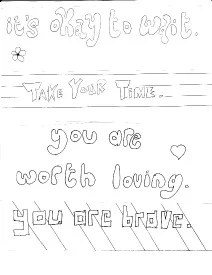When Your Protection Becomes Your Prison: Understanding Your Inner Critic
You know those harsh, penetrating thoughts you have-- the ones that haunt you, even when you do something you love? The thoughts that tell you you’re not good enough, that you should “shut up” and “stop thinking you’re all that”, that try to beat you into submission? Yeah, those thoughts. The ones that hurt.
What if I told you those thoughts were actually there to help you?
Let’s consider for a moment that you are a child, and you’re doing something that feels fun. You’re feeling safe, so you play. You’re in “the flow.” Suddenly, someone shouts at you: “Stop doing that!” and takes away the rusty nail you’re about to put down your gullet.
Now, that voice is in you, reminding you: "Don’t eat the rusty nail!" That’s good, right? But it feels scary to be shocked out of that "flow". Let’s say you didn’t have someone there to tell you that you’re going to be ok. We could even go so far as to say, what if the person chided you, or shamed you for wanting to explore the world around you?
Now, that voice has a chance to grow bigger. It grows louder. It makes you wonder: Well, when I was feeling safe and playing, I learned I was bad. Maybe I shouldn’t let my guard down like that.
That harsh inner critic used to be a voice outside of you, but now it's lodged itself inside of you. It's your armor and your guard, after all.
And then, sometime, when you’re feeling safe, and feeling in “the flow”, and you start to let your guard down, the voice that's now deep inside you says,
“DON’T!”
And you are brought right back in to an anxious, guarded, vigilant place.
You might even start feeling really badly about yourself.
You might start to feel like everything you’re curious about is actually bad for you.
But even though your inner critic might be really loud sometimes, you do have inner resources that can help you. Those resources are intertwined with understanding, and offering kindness and relaxation to, that the harsh, overprotective, and now harmful voice. We can find ways to lessen the harshness and add kindness by getting to know what feels scary, overwhelming, and challenging to you.
We all need validation of the parts of us that soar, and because the harsh critical voice often feels like the “true” voice, it can be easier to find yourself in situations where the criticisms are echoed in the people around you. It can also feel very difficult to accept the warm, kind voices, since they can actually have the opposite effect and make the inner critic louder.
What ways have you found to still the inner critic, for even just a moment?
Sometimes, that critic can feel so powerful that the only thing we can do is distract from it. Watching TV, cleaning the bathroom, going for a run, taking a nap—these are all ways we can distract ourselves from perseverating on the harsh inner landscape. Try to notice this process of distracting yourself from the fearful feelings so that you can make it to the other side. If you can spend just a few seconds identifying that that’s what you’re doing, then you’ve begun to offer some space to breathe and begin to allow yourself the option to feel just a little bit differently.
These moments you offer yourself are an important reminder that what you do best is survive. Sometimes, your survival skills can become restrictive and unhelpful, which can perpetrate more criticism and despondency. It is crucial at these times that you remind yourself, however you need to-- post it notes, a loved one, a video of yourself, or a snap of a rubberband on the wrist-- that there is more to your life than just this feeling, and that this feeling thinks it’s doing its job by protecting you. This feeling doesn’t quite get, yet, that it’s hurting you more than it is doing good for you.
But maybe it can learn, with kindness and time, to trust itself again. And, instead of protecting you, maybe together you both will learn that you deserve to explore, to discover what’s thrilling to you, to try on new things, and to take risks in places that could be healing and delicious for you.
Maybe, paying attention to this harsh, critical part of you will be just the thing to help you unlock what is healing, soothing, and reparative for you. Paying attention to the painful stuff may just be the way to open up new possibilities for you of how you relate to yourself and your world.
For more on letting go and noticing your patterns, I recommend listening to any of Pema Chödrön’s talks, which can be found on the Shambhala Press website. If you are interested in contacting your difficult feelings and attending to your inner critic, I encourage you to call me at 510-594-4035 to talk about how therapy with me could help you understand and work with some of the harshness of your protective self. I provide depth psychotherapy in Berkeley, CA. This piece is not intended to treat, diagnose, prevent, or cure any disease, and is not intended to provide psychotherapeutic treatment to anyone who reads or interacts with it.
To cite this page: Merson, M. (2014) When Your Protection Becomes Your Prison: Understanding Your Inner Critic. Retrieved month/day/year from http://mollymerson.com/2014/04/23/understanding-your-inner-critic/








